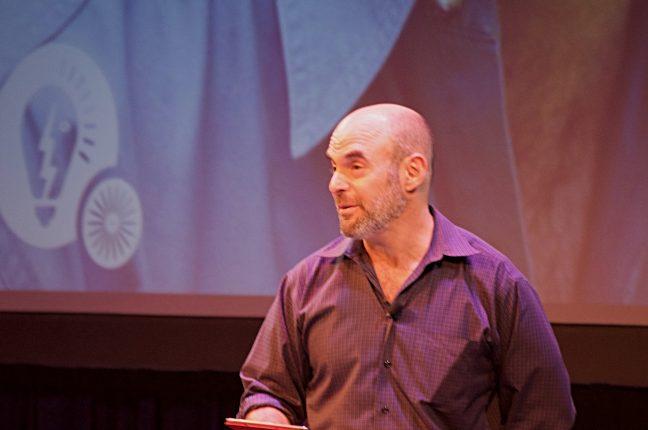They say dissecting a joke is a lot like dissecting a frog, no one wants to do it and the frog dies, but that didn’t stop Peter Sagal from doing just that at Memorial Union Monday evening.
The 18 year “Wait Wait… Don’t Tell Me!” host visited the University of Wisconsin as part of the Distinguished Lecturer Series. Sagal spoke at length about the nature of a good joke and its ability to create important shared experiences.
After describing how he unintentionally became the host of “Wait Wait… Don’t Tell Me!,” Sagal demonstrated a series of jokes, humorous tweets and funny cat videos. The purpose: to demonstrate what he believes are the key components of a joke.
Every joke, Sagal said, contains shared elements such as desire, shared context and surprise. He illustrated this with a couple of his favorite tweets.
“Actually Frankenstein was the name of the scientist, I, the person correcting you on this trivial point am the monster,” Sagal said.
UW professor urges exploration, shares discoveries as Distinguished Lecturer
In each case, an actor has a desire and acts out their pursuit of this desire in some sort of context, Sagal said. The surprise at the end of the joke is effective because it thwarts this pursuit in an unexpected way.
In addition to this basic format for a joke, each instance of humor strives to convey a sense of spontaneity that pulls the audience out of what Sagal describes as their life narrative.
“What ultimately lies underneath all humor is … that sense of surprise but also a sense of connection,” Sagal said. “For that moment we are out of our heads and we are connected together in way our society and our narratives normally prevent.”
This life narrative, Sagal said, is ongoing narration of one’s existence which follows everyone and categorizes everything as being a cause or an effect without necessarily experiencing the moment.
During the beginning of his career Sagal said he aspired to be the next great American playwright, but in the years since then he has come to enjoy his role as a comedian. During those moments in his show where he can elicit laughter, Sagal said he feels a sense of connection and freedom.
“Ultimately, humor is about spontaneity surprise, desire, a little bit of tragedy but mostly human connection,” Sagal said.

















